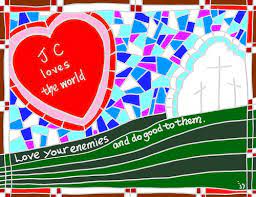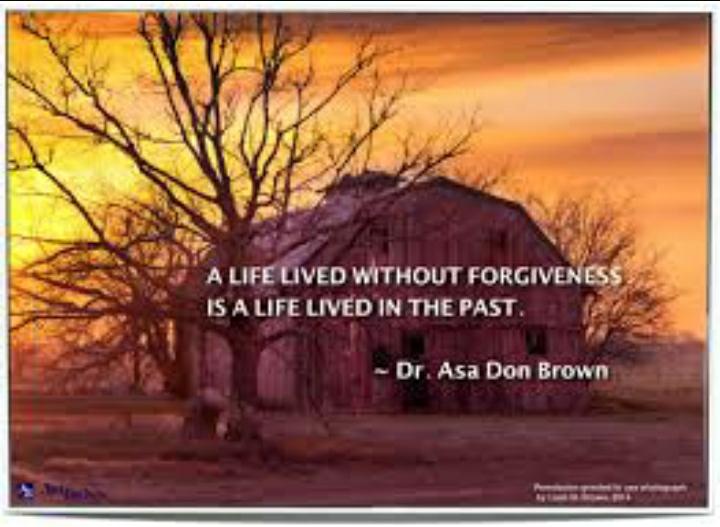 St Alban’s Episcopal Church Bolivar, Missouri Sunday, February 20 7th Sunday after EpiphanyYear C Forgiveness  Genesis 45:3-11, 15 The Old Testament reading for Sunday is the story of Joseph forgiving his brothers who had sold him into slavery. Before you hear the reading on Sunday, it would be good to go back to the beginning of this story, to refresh your memory – and to make sure your children know it, too. Try reading this part of the story of Jacob/Israel in Genesis simply as a story – beginning with chapter 37. Or tell it to them after you’ve read it. Or use a children’s Bible story book to simplify it. What it matters to know is this: Joseph was betrayed by his older brothers because they were jealous (chapter 37:11) and so they decided to kill him and pretend that a wild beast had done it. But his brother Reuben convinced them not to kill him, but to leave him in a pit, He intended to rescue him later. The others, however, decided to sell Joseph into slavery. So they sold him to a passing caravan taking goods down to Egypt. They took his garment and having killed a goat, put that blood on the coat and told their father that an animal had killed Joseph. Jacob grieved without stopping, for the loss of Joseph. Meanwhile, the caravan had gone into Egypt and sold Joseph to one of Pharaoh’s guards, Potiphar. Now he had many adventures there – which you might read if you wish, but which aren’t necessary to understanding Sunday’s story. It does matter, though to know that Joseph eventually rose to power in Egypt, becoming second only to Pharaoh himself. He went out into the land and during seven years of good harvest, he built grainaries throughout the land and made sure there would be abundant food in case of drought. Eventually the seven years of drought began. It affected every area, including Canaan, where Jacob lived.There was food in Egypt, but not in Canaan. So Jacob sent the older brothers to buy grain, leaving the youngest, Benjamin at home. When they came to the governor, Joseph, they did not recognize him, but he recognized them. Eventually they leave Simeon as hostage, and take the grain they have bought back home – promising to bring Benjamin the next time. There is grief. There is fear. But eventually they have to return for food again. Joseph is overwhelmed to see Benjamin, and to hear that his father is alive – Finally, we come to Sunday’s reading: “I am your brother, Joseph, whom you sold into Egypt. And now do not be distressed or angry with yourselves because you sold me here; for God sent me before you to preserve life.” That is a long tale, which children actually do love. And they understand, if we don’t, that sometimes the worst stories have the best endings. And they understand that it didn’t have to turn out this way. Joseph could have refused to forgive the injustice done to him. But in the Bible narrative, Joseph is a key figure, Israel (man and patriarch and people) would not have survived the famine, would not have found refuge in Egypt, would not have survived to become the people God called our of Egypt to their promised land. In the story, Joseph’s choice to forgive so much, and so radically, changes everything.  Luke 6:27-38 Jesus said, “I say to you that listen, Love your enemies, do good to those who hate you, bless those who curse you, pray for those who abuse you. If anyone strikes you on the cheek, offer the other also; and from anyone who takes away your coat do not withhold even your shirt. Give to everybody who begs from you; and if anyone takes away your goods, do not ask for them again. Do unto others as you would have them do to you. If you love those who love you, what credit is that to you? For even sinners love those who love them. If you do good to those who do good to you, what credit is that to you? For even sinners do the same. If you lend to those from whom you hope to receive, what credit is that to you? Even sinners lend to sinners, to receive as much again. But love your enemies, do good and lend, expecting nothing in return. Your reward will be great, and you will be children of the Most High; for he is kind to the ungrateful and the wicked. Be merciful, just as your Father is merciful. Do not judge, and you will not be judged; do not condemn and you will not be condemned. Forgive, and you will be forgiven; give and it will be given to you. A good measure, pressed down, shaken together, running over, will be put into your lap; for the measure you give will be the measure you get back.”  What if your “enemy,” the one you find hard to forgive – or to ask forgiveness of, was really once your friend? What if you broke a friendship – or feel that someone else did – and now you don’t know how to repair it? What if you had to admit that the friendship failed because neither “side” could really hear what the other was saying? What if your fear – or shock – when you saw something that seemed wrong, that you couldn’t understand, and your rejection of the other, hurt you as well as them? And what if their willingness to maintain boundaries and stay away has also hurt you both? What does forgiveness look like then?What could it look like? What might restoration cost you? Or the other? What do we miss by holding out? Is it worth it? I was young. Now I am old. And I can tell you for sure that old hurts – those wrongs done to me, and those I have caused, don’t just evaporate. What if we just stopped and took Jesus seriously this week? What acts of healing and reconciliation might we dare to engage – without demanding that the other go first? |

Categories:
No Category
Tags:
No responses yet